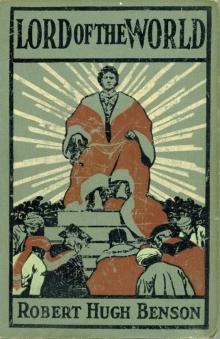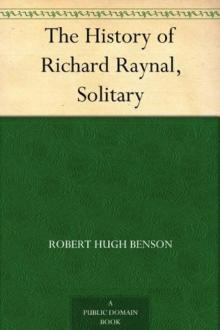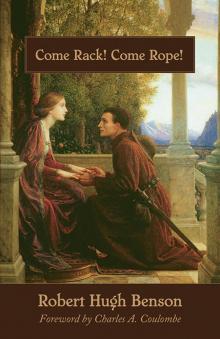- Home
- Robert Hugh Benson
Come Rack, Come Rope Page 2
Come Rack, Come Rope Read online
Page 2
“I thought it would be you,” she said, “when I heard the dogs.”
She piled the fast rolls of linen in an ordered heap, and came to sit beside him. Robin took one hand in his and sat silent.
She was of an age with him, perhaps a month the younger; and, as it ought to be, was his very contrary in all respects. Where he was fair, she was pale and dark; his eyes were blue, hers black; he was lusty and showed promise of broadness, she was slender.
“And what news do you bring with you now?” she said presently.
He evaded this.
“Mistress Manners?” he asked.
“Mother has a megrim,” she said; “she is in her chamber.” And she smiled at him again. For these two, as is the custom of young persons who love one another, had said not a word on either side—neither he to his father nor she to her parents. They believed, as young persons do, that parents who bring children into the world, hold it as a chief danger that these children should follow their example, and themselves be married. Besides, there is something delicious in secrecy.
“Then I will kiss you again,” he said, “while there is opportunity.”
Making love is a very good way to pass the time. He spoke of a hundred things that were of no importance: of the dress that she wore—russet, as it should be, for country girls, with the loose sleeves folded back above her elbows that she might handle the linen; her apron of coarse linen, her steel-buckled shoes. He told her that he loved her better in that than in her costume of state—the ruff, the brocaded petticoat, and all the rest. He talked then, of Tuesday seven-night, when they would meet for hawking in the lower chase of the Padley estates; and proceeded then to speak of Agnes, whom he had left on the fist of the man who had taken his mare, of her increasing infirmities and her crimes of crabbing; and all the while he held her left hand in both of his, and fitted her fingers between his, and kissed them again when he had no more to say on any one point; and wondered why he could not speak of the matter on which he had come, and how he should tell her. And then at last she drew it from him.
“And now, my Robin,” she said, “tell me what you have in your mind. You have talked of this and that and Agnes and Jock, and Padley chase, and you have not once looked me in the eyes since you first came in.”
Now it was not shame that had held him from telling her, but rather a kind of bewilderment. The affair might hold shame, indeed, or anger, or sorrow, or complacence, but he did not know; and he wished, as young men of decent birth should wish, to present the proper emotion on its right occasion. He had pondered on the matter continually since his father had spoken to him on St. Stephen’s night; and at one time it seemed that his father was acting the part of a traitor and at another of a philosopher. If it were indeed true, after all, that all men were turning Protestant, and that there was not so much difference between the two religions, then it would be the act of a wise man to turn Protestant too, if only for a while. And on the other hand his pride of birth and his education by his mother and his practice ever since drew him hard the other way. He did not know what to think, and he feared what Marjorie might think.
“How did you know I had anything in my mind?” he asked. “Is it not enough reason for my coming that you should be here?”
She laughed softly, with a pleasant scornfulness.
“I read you like a printed book,” she said. “What else are women’s wits given them for?”
He fell to stroking her hand again at that, but she drew it away.
“Not until you have told me,” she said.
So then he told her.
It was a long tale, for it began as far ago as last August, when his father had come back from giving evidence before the justices at Derby on a matter of witchcraft, and had been questioned again about his religion. It was then that Robin had seen moodiness succeed to anger, and long silence to moodiness. He told the tale with a true lover’s art, for he watched her face and trained his tone and his manner as he saw her thoughts come and go in her eyes and lips, like gusts of wind across standing corn; and at last he told her outright what his father had said to him on St. Stephen’s night, and how he himself had kept silence.
Marjorie’s face flamed up bright and rosy as he finished.
“You kept silence!” she cried.
“I did not wish to anger him, my dear; he is my father,” he said gently.
The colour died out of her face again and she nodded once or twice, and a great pensiveness came down on her. He took her hand again softly, and she did not resist.
“The only doubt,” she said presently, as if she talked to herself, “is whether you had best be gone at Easter, or stay and face it out.”
“Yes,” said Robin, with his dismay come fully to the birth.
Then she turned on him, full of a sudden tenderness and compassion.
“Oh! my Robin,” she cried, “and I have not said a word about you and your own misery. I was thinking but of Christ’s honour. You must forgive me.… What must it be for you! … That it should be your father! You are sure that he means it?”
“My father does not speak until he means it. He is always like that. He asks counsel from no one. He thinks and he thinks, and then he speaks; and it is finished.”
She fell then to thinking again, her sweet lips compressed together, and her eyes frightened and wondering, searching round the hanging above the chimney-breast. (It presented Icarus in the chariot of the sun; and it was said in Derby that it had come from my lord Abbot’s lodging at Bolton.)
Meantime Robin thought too. He was as wax in the hands of this girl, and knew it, and loved that it should be so. Yet he could not help his dismay while he waited for her seal to come down on him and stamp him to her model. For he foresaw more clearly than ever now the hundred inconveniences that must follow, now that it was evident that to Marjorie’s mind (and therefore to God Almighty’s) there must be no tampering with the old religion. He had known that it must be so; yet he had thought, on the way here, of a dozen families he knew who, in his own memory, had changed from allegiance to the Pope of Rome to that of her Grace, without seeming one penny the worse. There were the Martins, down there in Derby; the Squire and his lady of Ashenden Hall; the Conways of Matlock; and the rest—these had all changed; and though he did not respect them for it, yet the truth was that they were not yet stricken by thunderbolts or eaten by the plague. He had wondered whether there were not a way to do as they had done, yet without the disgrace of it.… However, this was plainly not to be so with him.
She turned to him again at last. Twice her lips opened to speak, and twice she closed them again. The third time she spoke.
“I think you must go away,” she said, “for Easter. Tell your father that you cannot change your religion simply because he tells you so. I do not see what else is to be done. He will think, perhaps, that if you have a little time to think you will come over to him. Well, that is not so, but it may make it easier for him to believe it for a while.… You must go somewhere where there is a priest.… Where can you go?”
Robin considered.
“I could go to Dethick,” he said.
“That is not far enough away, I think.”
“I could come here,” he suggested artfully.
A smile lit in her eyes, shone in her mouth, and passed again into seriousness.
“That is scarcely a mile further,” she said. “We must think.… Will he be very angry, Robin?”
Robin smiled grimly.
“I have never withstood him in a great affair,” he said. “He is angry enough over little things.”
“Poor Robin!”
“Oh! he is not unjust to me. He is a good father to me.”
“That makes it all the sadder,” she said.
“And there is no other way?” he asked presently.
She glanced at him.
“Unless you would withstand him to the face. Would you do that, Robin?”
“I will do anything you tell me,” he said si
mply.
“You darling! … Well, Robin, listen to me. It is very plain that sooner or later you will have to withstand him. You cannot go away every time there is communion at Matstead, or, indeed, every Sunday. Your father would have to pay the fines for you, I have no doubt, unless you went away altogether. But I think you had better go away for this time. He will almost expect it, I think. At first he will think that you will yield to him; and then, little by little (unless God’s grace brings himself back to the Faith), he will learn to understand that you will not. But it will be easier for him that way; and he will have time to think what to do with you, too.… Robin, what would you do if you went away?”
Robin considered again.
“I can read and write,” he said. “I am a Latinist. I can train falcons and hounds and break horses. I do not know if there is anything else that I can do.”
“You darling!” she said again.
These two were as simple as children, and as serious. How could they ever wed if Robin were to quarrel with his father? There was the Religion which was in their bones and blood—the Religion for which already they had suffered and their fathers before them. There was the honour and loyalty which this new and more personal suffering demanded now louder than ever; and in Marjorie at least there was a strong love of Jesus Christ and His Mother, whom she knew, from her hidden crucifix and her beads, and her Jesus Psalter—which she used every day—as well as in her own soul—to be wandering together once more among the hills of Derbyshire, sheltering, at peril of Their lives, in stables and barns and little secret chambers, because there was no room for Them in Their own places. It was this last consideration, as Robin had begun to guess, that stood strongest in the girl; it was this, too, as again he had begun to guess, that made her all that she was to him, that gave her that strange serious air of innocency and sweetness, and drew from him a love that was nine-tenths reverence and adoration.
So then they sat and considered and talked. They did not speak much of her Grace, nor of her Grace’s religion, nor of her counsellors and affairs of state: these things were but toys and vanities compared with matters of love and faith; neither did they speak much of the Commissioners that had been to Derbyshire once and would come again, or of the alarms and the dangers and the priest hunters, since those things did not at present touch them very closely. It was rather of Robin’s father, and whether and when the maid should tell her parents, and how this new trouble would conflict with their love. They spoke, that is to say, of their own business and of God’s; and of nothing else. The frosty sunshine crept down the painted wainscot and lay at last at their feet, reddening to rosiness….
III
Robin rode away at last with a very clear idea of what he was to do in the immediate present, and with no idea at all of what was to be done later. Marjorie had given him three things—advice, a pair of beads that had been the property of Mr. Cuthbert Maine, seminary priest, recently executed in Cornwall for his religion, and a kiss—the first deliberate, free-will kiss she had ever given him. The first he was to keep, the second he was to return, the third he was to remember; and these three things, or, rather, his consideration of them, worked upon him as he went. Her advice, besides that which has been described, was, principally, to say his Jesus Psalter more punctually, to hear Mass whenever that were possible, to trust in God, and to be patient and submissive with his father in all things that did not touch divine love and faith. The pair of beads that were once Mr. Maine’s, he was to keep upon him always, day and night, and to use them for his devotions. The kiss—well, he was to remember this, and to return it to her upon their next meeting.
A great star came out as he drew near home. His path took him not through the village, but behind it, near enough for him to hear the barkings of the dogs and to smell upon the frosty air the scent of the wood fires. The house was a great one for these parts. There was a small gate-house before it, built by his father for dignity, with a lodge on either side and an arch in the middle, and beyond this lay the short road, straight and broad, that went up to the court of the house. This court was, on three sides of it, buildings; the hall and the buttery and the living-rooms in the midst, with the stables and falconry on the left, and the servants’ lodgings on the right; the fourth side, that which lay opposite to the little gate-house, was a wall, with a great double gate in it, hung on stone posts that had, each of them, a great stone dog that held a blank shield. All this later part, the wall with the gate, the stables and the servants’ lodgings, as well as the gate-house without, had been built by the lad’s father twenty years ago, to bring home his wife to; for, until that time, the house had been but a little place, though built of stone, and solid and good enough. The house stood half-way up the rise of the hill, above the village, with woods about it and behind it; and it was above these woods behind that the great star came out; and Robin looked at it, and fell to thinking of Marjorie again, putting all other thoughts away. Then, as he rode through into the court on to the cobbled stones, a man ran out from the stable to take his mare from him.
“Master Babington is here,” he said. “He came half an hour ago.”
“He is in the hall?”
“Yes, sir; they are at supper.”
The hall at Matstead was such as that of most esquires of means. Its daïs was to the south end, and the buttery entrance and the screens to the north, through which came the servers with the meat. In the midst of the floor stood the reredos with the fire against it, and a round vent overhead in the roof through which went the smoke and came the rain. The tables stood down the hall, one on either side, with the master’s table at the daïs end set cross-ways. It was not a great hall, though that was its name; it ran perhaps forty feet by twenty. It was lighted, not only by the fire that burned there through the winter day and night, but by eight torches in cressets that hung against the walls and sadly smoked them; and the master’s table was lighted by six candles, of latten on common days and of silver upon festivals.
There were but two at the master’s table this evening, Mr. Audrey himself, a smallish, high-shouldered man, ruddy-faced, with bright blue eyes like his son’s, and no hair upon his face (for this was the way of old men then, in the country, at least); and Mr. Anthony Babington, a young man scarcely a year older than Robin himself, of a brown complexion and a high look in his face, but a little pale, too, with study, for he was learned beyond his years and read all the books that he could lay hand to. It was said even that his own verses, and a prose-lament he had written upon the Death of a Hound, were read with pleasure in London by the lords and gentlemen. It was as long ago as ’71, that his verses had first become known, when he was still serving in the school of good manners as page in my Lord Shrewsbury’s household. They were considered remarkable for so young a boy. So it was to this company that Robin came, walking up between the tables after he had washed his hands at the lavatory that stood by the screens.
“You are late, lad,” said his father.
“I was over to Padley, sir.… Good-day, Anthony.”
Then silence fell again, for it was the custom in good houses to keep silence, or very nearly, at dinner and supper. At times music would play, if there was music to be had; or a scholar would read from a book for awhile at the beginning, from the holy gospels in devout households, or from some other grave book. But if there were neither music nor reading, all would hold their tongues.
Robin was hungry from his riding and the keen air; and he ate well. First he stayed his appetite a little with a hunch of cheat-bread, and a glass of pomage, while the servant was bringing him his entry of eggs cooked with parsley. Then he ate this; and next came half a wild-duck cooked with sage and sweet potatoes; and last of all a florentine which he ate with a cup of Canarian. He ate heartily and quickly, while the two waited for him and nibbled at marchpane. Then, when the doors were flung open and the troop of servants came in to their supper, Mr. Audrey blessed himself, and for them, too; and they went out by a door behind into
the wainscoted parlour, where the conserves and muscadel awaited them. For this, or like it, had been the procedure in Matstead hall ever since Robin could remember, when first he had come from the women to eat his food with the men.
“And how were all at Booth’s Edge?” asked Mr. Audrey, when all had pulled off their boots in country fashion, and were sitting each with his glass beside him.
“I saw Marjorie only, sir,” said the boy. “Mr. Manners was in Derby, and Mrs. Manners had a megrim.”
“Mrs. Manners is ageing swifter than her husband,” observed Anthony.
There seemed a constraint upon the company this evening. Robin spoke of his ride, of things which he had seen upon it, of a wood that should be thinned next year; and Anthony made a quip or two such as he was accustomed to make; but the master sat silent for the most part, speaking to the lads once or twice for civility’s sake, but no more. And presently silences began to fall, that were very unusual things in Mr. Anthony’s company, for he had a quick and a gay wit, and talked enough for five. Robin knew very well what was the matter; it was what lay upon his own heart as heavy as lead; but he was sorry that the signs of it should be so evident, and wondered what he should say to his friend Anthony when the time came for telling; since Anthony was as ardent for the old Faith as any in the land. It was a bitter time, this, for the old families that served God as their fathers had, and desired to serve their prince too; for, now and again, the rumour would go abroad that another house had fallen, and another name gone from the old roll. And what would Anthony Babington say, thought the lad, when he heard that Mr. Audrey, who had been so hot and persevered so long, must be added to these?
An agony seized upon Robin lest his father should say all that was in his mind. He knew it must be said; yet he feared its saying, and with a quick wit he spoke of that which he knew would divert his friend.
“And the Queen of the Scots,” he said. “Have you heard more of her?”

 The Dawn of All
The Dawn of All By What Authority?
By What Authority? The King's Achievement
The King's Achievement Lord of the World
Lord of the World The History of Richard Raynal, Solitary
The History of Richard Raynal, Solitary Come Rack, Come Rope
Come Rack, Come Rope